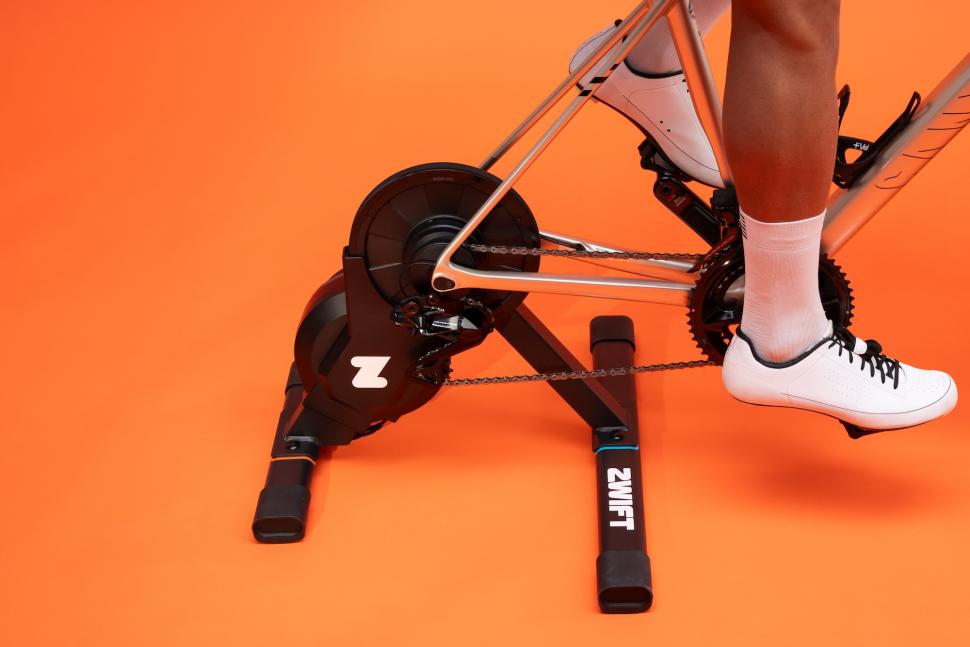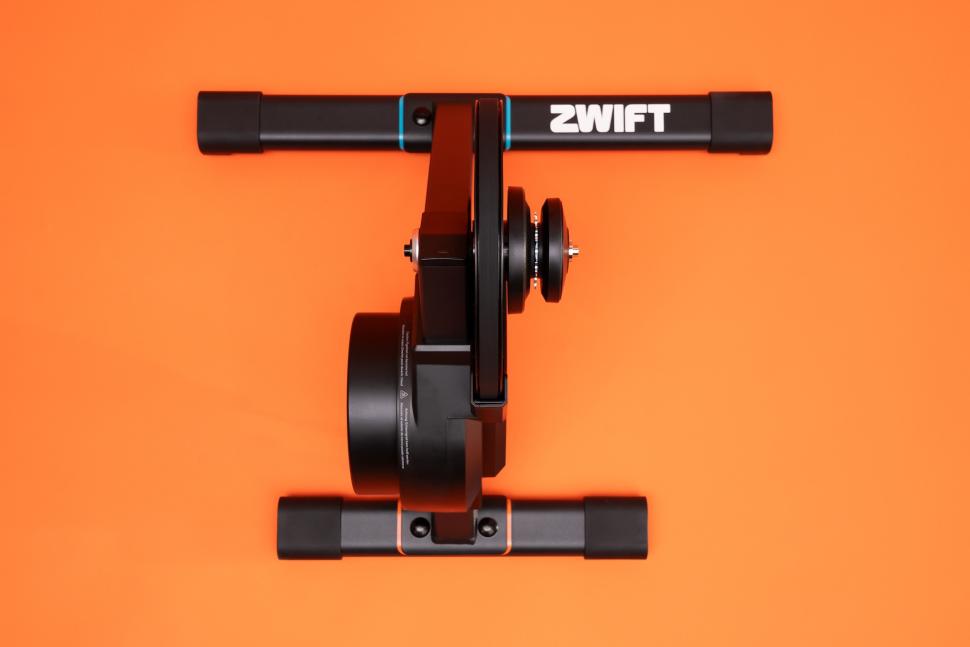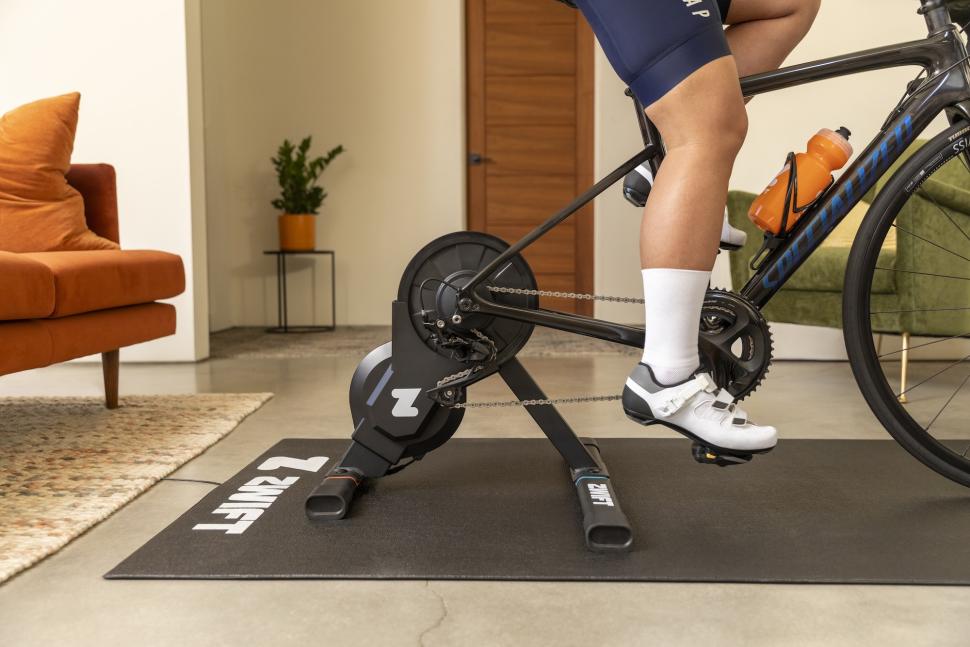- News
- Reviews
- Bikes
- Components
- Bar tape & grips
- Bottom brackets
- Brake & gear cables
- Brake & STI levers
- Brake pads & spares
- Brakes
- Cassettes & freewheels
- Chains
- Chainsets & chainrings
- Derailleurs - front
- Derailleurs - rear
- Forks
- Gear levers & shifters
- Groupsets
- Handlebars & extensions
- Headsets
- Hubs
- Inner tubes
- Pedals
- Quick releases & skewers
- Saddles
- Seatposts
- Stems
- Wheels
- Tyres
- Tubeless valves
- Accessories
- Accessories - misc
- Computer mounts
- Bags
- Bar ends
- Bike bags & cases
- Bottle cages
- Bottles
- Cameras
- Car racks
- Child seats
- Computers
- Glasses
- GPS units
- Helmets
- Lights - front
- Lights - rear
- Lights - sets
- Locks
- Mirrors
- Mudguards
- Racks
- Pumps & CO2 inflators
- Puncture kits
- Reflectives
- Smart watches
- Stands and racks
- Trailers
- Clothing
- Health, fitness and nutrition
- Tools and workshop
- Miscellaneous
- Buyers Guides
- Features
- Forum
- Recommends
- Podcast
TECH NEWS
 2023 Zwift Hub One trainer - 8
2023 Zwift Hub One trainer - 8Zwift launches new Hub One smart trainer with virtual shifting and single cassette sprocket for max compatibility
Zwift has introduced a Hub One smart trainer where the standard cassette is replaced by the 'Zwift Cog' single sprocket and, instead, you get virtual shifting via a wireless shifter that mounts to your handlebar. Zwift promises you “fast, smooth, and quiet virtual shifting that was previously only available on smart bikes” and says that this is a super-easy route to ride its online 3D world.
Zwift already has a Hub in its range, where you remove the rear wheel from your bike and run the chain around a cassette that’s mounted directly to the trainer. That option remains, although it’s called the Zwift Hub Classic from here on in.
> Read our review of the Zwift Hub smart trainer
What’s new with the Zwift Hub One is the use of the pre-installed ‘Zwift Cog’. Rather than your chain moving across a cassette, it always runs on the Zwift Cog. You can still shift, but now virtually. The resistance is altered by the Hub One internally when you hit the wireless Zwift Click shifter mounted to your handlebar.
What are the advantages?
The Zwift Cog allows the trainer to work with most 8-12 speed bikes, Zwift says. Although an 11-speed cassette is the most popular option sold on existing Zwift Hub smart trainers – now called Zwift Hub Classic, remember – 54% are currently sold with other cassette options. A single sprocket simplifies things and allows you to use bikes with different setups on the same trainer.
“Thanks to its unique design, riders can put chain drops in the past as sides act as a chain retention device,” says Zwift.
“In addition to its wide compatibility, Zwift Hub One enables cyclists to take advantage of the many benefits of virtual shifting. Virtual shifting, normally only seen on smart bikes, is now available to those who prefer the value and convenience of a trainer.
“With virtual shifting, cyclists will enjoy shifting free of lag and chain skips, even when shifting under load. Modern smart bikes are now so quiet, the loudest noise when riding actually comes from the bike’s physical drivetrain. With virtual shifting, much of this added noise is eliminated, leaving the rest of your house in peace while you sweat it out in the virtual world of Watopia.”
> Check out the best turbo trainers 2023
As mentioned, it’s the Zwift Click that controls your virtual shifts, and this mounts to your handlebar – road bar, flat bar, or TT bar – via two rubber O-rings. You just push the plus or minus button to move through the 24 different levels of resistance.
“To ensure consistency between bikes, Zwift Hub One is able to detect the gear ratios on your physical bike which allows it to set the virtual gears accordingly,” says Zwift. “It achieves this through a process called ‘real gear ratio calibration’. The trainer does this within the first few seconds of every ride automatically. Magic.”
In fact, Hub One calculates the real chainring size of the bike mounted on Hub from cadence and flywheel speed, and then auto-calibrates resistance.
Zwift says, “In addition to delivering benefits to those with multiple bikes, real gear ratio calibration offers new benefits to riders using smaller chainrings, like those found on gravel and mountain bikes, preventing those riders from spinning out on flat or downhill terrain in Zwift.”
Your current gear is shown on the Zwift screen as you ride.
If you already own a Zwift Hub, you have two options for switching to virtual shifting. Once updated to Zwift Hub Firmware version 5.2 (or newer), Zwift Play (£99) owners can turn Virtual Shifting on from their settings menu. Side buttons on the Play Controllers allow for virtual shifting.
The alternative is to update an existing Zwift Hub with a Zwift Cog + Zwift Click package, the Zwift Cog pre-installed on a freehub. It’ll be priced at £59.99 for a limited time after launch, and will then increase to £79.99. There’s one on the way for review on road.cc but we’ve yet to try it out.
Anyone wanting to use virtual shifting will need to update to Zwift version 1.50 which will be rolled out at some time between now and Friday.
Zwift Hub One is available now and the Zwift Hub Classic, which comes with a choice of 8-speed to 12-speed cassettes, remains in the range. Each is priced at £549 and includes a year’s Zwift membership.
Mat has been in cycling media since 1996, on titles including BikeRadar, Total Bike, Total Mountain Bike, What Mountain Bike and Mountain Biking UK, and he has been editor of 220 Triathlon and Cycling Plus. Mat has been road.cc technical editor for over a decade, testing bikes, fettling the latest kit, and trying out the most up-to-the-minute clothing. He has won his category in Ironman UK 70.3 and finished on the podium in both marathons he has run. Mat is a Cambridge graduate who did a post-grad in magazine journalism, and he is a winner of the Cycling Media Award for Specialist Online Writer. Now over 50, he's riding road and gravel bikes most days for fun and fitness rather than training for competitions.
Latest Comments
- slc 34 sec ago
Agreed, although women face additional barriers in busy places too. All the women cyclists I know report a much higher level of abusive behaviour...
- headingley 19 min 13 sec ago
Who actually cares if "bike to work" bikes aren't actually used for daily commuting ? (Apart from The Telegraph, of course) The fact that you can...
- Hirsute 27 min 48 sec ago
He does it to make a point. As I remember from his videos he is rarely not in control of the situation. Although as it's all on shitter these days,...
- Car Delenda Est 30 min 32 sec ago
Probably worth pointing out at some point that the Telegraph is on the Cycle to Work Scheme..
- mark1a 32 min 41 sec ago
It gets posted in road.cc comments around six times daily.
- mdavidford 33 min 46 sec ago
But if it's a bridleway or a permissive path they're within their rights to be.
- Secret_squirrel 1 hour 15 min ago
This is my favourite rant - but I really dont see the point of windproof cycling clobber that isn't properly waterproof - especially for the UK. ...
- leedorney 1 hour 24 min ago
Whenever I drive, which isn't much, I often wonder why other seem to just not care at all, it's like so sense and appreciation for any other human...
- chrisotherwise 1 hour 34 min ago
Thanks for all the kind replies. I was back on my bike yesterday and went and had a look at where I had my fall. No obvious diesel on the road or...
- Bob Sprocket 1 hour 42 min ago
Toe clips, now we're talking.






Add new comment
14 comments
My bike has gears of it's own. I may of course be missing the point.
I don't understand how this could know if my bike was 10, 11 or 12 speed. Also, how would it know if I was running 11-28 or 11-32 for instance.
The only way I can see how it's done is if you input onto an app before starting - or am I missing something?
The article explains it - it does it by magic.
Thanks for the explanation
I've just watched the GCN Tech video on it and that says the same - 'Magic'
I put my bike on it and it can sense that I ride 50/34 and 11-28???
I guess they've imbued it with magic just after the manufacturing process, to give it a basic form of sentience, which can then give your bike sentience when you connect it. The Hub and your bike then talk to each other.
For those non-magical folks, I think this gives an idea of how they do it. If I am interpreting it correctly, it doesn't really know how many gears you have, it works out how fast your legs are spinning, how quick the flywheel is spinning and "changes gear" if it decides your legs aren't spinning fast enough/too fast. That would suggest that if your bike is 8speed, but you top out frequently on it, if you put it in this Hub, it will think you are on a 9+ speed
Sorry, not getting that at all. In theory if you kept topping out you would have an infinite number of gears?
You change gears with the button supplied with the trainer but I would still like to ride my bike with my gear ratios and I can't see how this can do it without me settng it up (on an app?) initially.
I don't understand why they haven't explained this part properly
Good point!
Yup - got to be magic.
According to DC Rainmaker's review you can't do that:
He doesn't seem that impressed with it overall, saying that if he was only using the trainer himself with the same bike every time he would always go for the cassette version. The only real advantage he mentions is that it's handy if you want to use lots of different bikes on it, e.g. if you're sharing it with someone else.
Thanks for that, I should have known DC Rainmaker would have already had a play on it. I haven't seen anything on the advertising info that says what the gear range is - and this is the bit that I find odd, why not just say that it's comparable to 52/36 and 11-30 for instance.
Wonder if it works on single speed frames?
i'm going to say: probably not. the single cog is where the middle of a cassette would be. the chainline probably wouldn't be right
Any idea whether this is Campag-compatible?
should be. it's a single cog and the chain pitch is the same across all groupsets